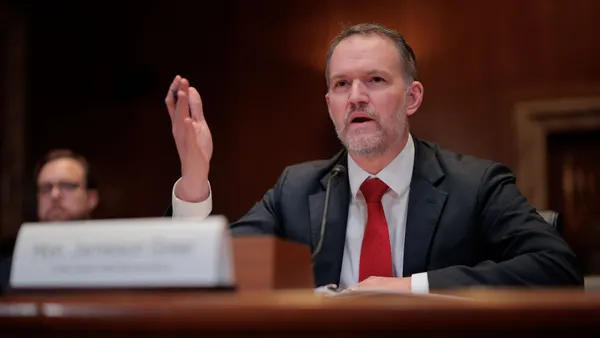Dive Brief:
- Everyone agrees that America's infrastructure needs work, but the best way to make it happen while still observing laws regarding conservation and preservation leave many flummoxed, The Wall Street Journal reported last week.
- While over the past 50 years federal spending on infrastructure has steadily decreased alongside slowed GDP and productivity growth, the environmental review process and age of roads has steadily increased during the same time period, according to an infographic by the Journal.
- Anticipating this conflict, President Trump announced an executive order requiring a hastening of reviews for particularly important projects. However, information regarding his proposed $1 trillion plan remains scarce and all infrastructure plans would require permission by Congress.
Dive Insight:
Among Trump's many campaign promises, one of the more prominent ones in terms of economics was his promise to rebuild America's infrastructure with a $1 trillion plan, thereby providing more jobs and increasing the nation's competitiveness. But The Wall Street Journal's findings show the process can be quite protracted at each step of the way.
Already, the president has experienced various procedural roadblocks to deliver on his process, the most prominent being from Republican leadership who, based on the Congressional agenda, claim it would be impossible to deliver a plan within the first 100-days. That has not stopped legislators from addressing the issue, but at least in terms of a federally-led plan little may get done in the first half of the year. Even if it does, competing proposals and debates over financial responsibility and how the project is funded may further delay hopes of a new deal in infrastructure spending.
What the Journal highlights shows that, even if a plan does pass, there is no guarantee it will succeed. Construction projects must comply with environmental regulations, and if there is evidence they do not, the project may be significantly delayed or scrapped altogether. Of course, compliance risk may be mitigated, but residents' feelings are more fickle. Grassroots movements against new projects are not uncommon, and have taken many a toll.
While port renovations, inland waterway repairs and much needed road fixes are hardly controversial, logistics professionals should not hold their breath for improvements to come quick or immediately. The Obama administration's stimulus package, which included significant spending on infrastructure, took years to complete. It turns out procedural challenges are the main roadblock in this regard.













